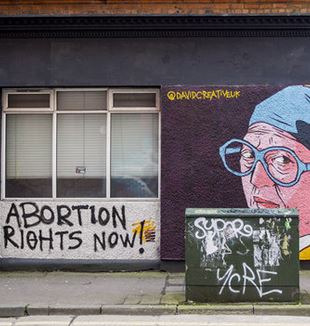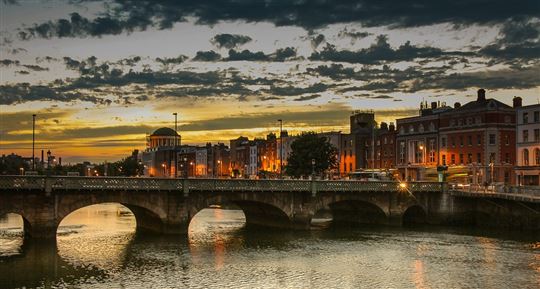
Referendum: A great divide or an impossible unity?
In late May, Irish voters will be called to decide on the eighth amendment to the Constitution: What decrees the equality of the right to life of mothers and unborn children? We published a message written by the CL community in Ireland.It is very hard not to think of a referendum as a conflictual moment. After all, people are often called upon to take a decision regarding matters considered decisive. In Ireland, as in other countries, referenda have too often been synonymous with division, conflict, bitterness and a “culture of walls”. The outcome inevitably produces joy as well as tears, mockery or resentment. The proposed referendum on repealing the Eight Amendment seems no different. It ticks all the boxes: a highly controversial question with a bitter history and parties well entrenched in their positions, their non-negotiable
principles.
But this referendum could be different. What if, because the question we are called to decide upon is of a completely different nature than say the abolition of the Seanad, we were to live this moment as a unique opportunity for a 360° reflection?
Let’s start with a question. How is it possible that truths and values that were once absolutely self-evident to everybody are no longer so, as in this referendum? What prevails is division, bewilderment about what constitutes the fundamentals in life in general, not only in the areas of the family or procreation. It is a situation that makes our questions more acute, as Cardinal Angelo Scola says: “What is sexual difference; what is love; what does it mean to procreate and to educate; why should we work; why may a pluralistic civil society be richer than a monolithic society; how can we meet one another to reciprocally build a working communion among all Christian communities and the good life in civil society; how can we renew finance and the economy; how can we face the fragilities of illness and death, and moral fragility; how can we seek justice; how can we constantly learn and share the needs of the poor? All of this must be re-written in our times, reconsidered and, therefore, re-lived” (Milan, 11 February 2014).
Too often, these questions lead to a stalemate. Values once thought to be engraved in the human heart, are today either dismissed or considered an opinion to be either respected or annihilated for the sake of progress. Condemning “progressive” views on the basis that they go against “what we have always believed” or “natural law” makes it difficult to understand where these views come from, what lies beneath the cry for more freedom to choose.
That great, once-immutable convictions should fade is not surprising. According to Benedict XVI, “incremental progress” is possible only in the material sphere. In the field of “ethical awareness and moral decision making, there is no similar possibility of accumulation for the simple reason that man’s freedom is always new and he must always make his decisions anew. These decisions can never simply be made for us in advance by others - if that were the case, we would no longer be free. Freedom presupposes that, in fundamental decisions, every person and every generation is a new beginning.” We always need to start over because the nature of the evidence for convictions is different from that for “material inventions. The moral treasury of humanity is not readily at hand like tools that we use; it is present as an appeal to freedom and a possibility for it” (Spe Salvi).
“Are we all missing something? Did we throw the baby out with the bathwater?” Whether or not Brendan O’Connor had read the Pope’s Encyclical before writing his article on Christmas day, the piece is certainly a testament to the Pope’s words. He continued: “People gave up the Church for various reasons. People gave it up because they didn’t like the Church’s attitude to women, or abortion. People gave it up because of the abuse, the hypocrisy, the cruelty, mother and baby homes, John McQuaid, the control they exerted over people’s lives, the way they shamed people for their very humanity while they were all too human themselves. Some people gave it up because it was boring, because it didn’t speak to them. We replaced it with lots of things... We replaced it with the gym and success and self-help and mindfulness and meditation...But sometimes at Christmas...you wonder if there isn’t something missing out there in the world, if we lost something when we rejected the heart of religion as we rejected the trappings and the human failings of it” (Sunday Independent, 24 December 2017).
With this referendum, everyone who allows himself or herself be provoked by those fundamental questions can truly win. These questions, like lava under a volcano, are burning in everybody’s heart. Jesus of Nazareth summarized them with a cry unmatched in history: “For what does it profit a man to gain the whole world and forfeit his soul?” (Mark 8:36)
When the din of the referendum dies down and everyday life surprises us again with its silent, unrelenting burden, the only sound which will not die down is the beating of our hearts. The constant hammering of this beat will remind us that we are made for happiness, we are made for life, we are made to be loved. It is the sound of a heart begging for meaning. And maybe when we realise this we will make room for the baby Jesus, who, even when rejected again and again, is always there waiting for us to call on Him. He begs for our heart.
Then we will be able to verify the impossible claim of Christ. It will not be the defense or abolition of values (endeavours that can seem ever more extraneous) that respond to the deepest needs of the heart, but He who is present here and now exactly as He was at the beginning. Only in front of this disarming beauty that conquers men and women of today like the first people who met Him - John and Andrew, the prostitute and the thief - is it possible to experience an impossible unity first and foremost with ourselves. Such unity, or at least openness, offers the possibility of dialogue amidst the growing threat of a “culture of walls”, of intolerance, of assuming that the other is an enemy to destroy.
Communion and Liberation, Ireland